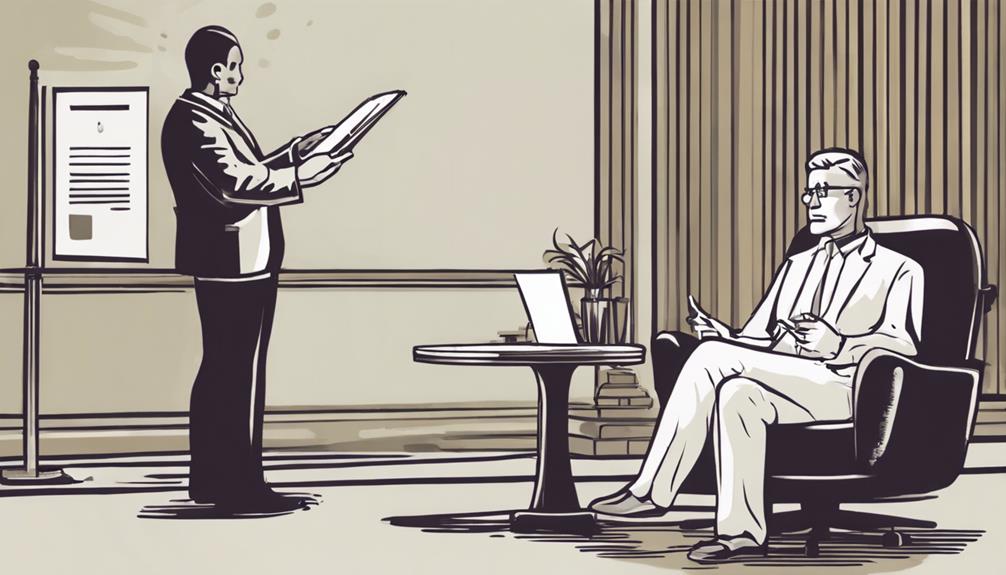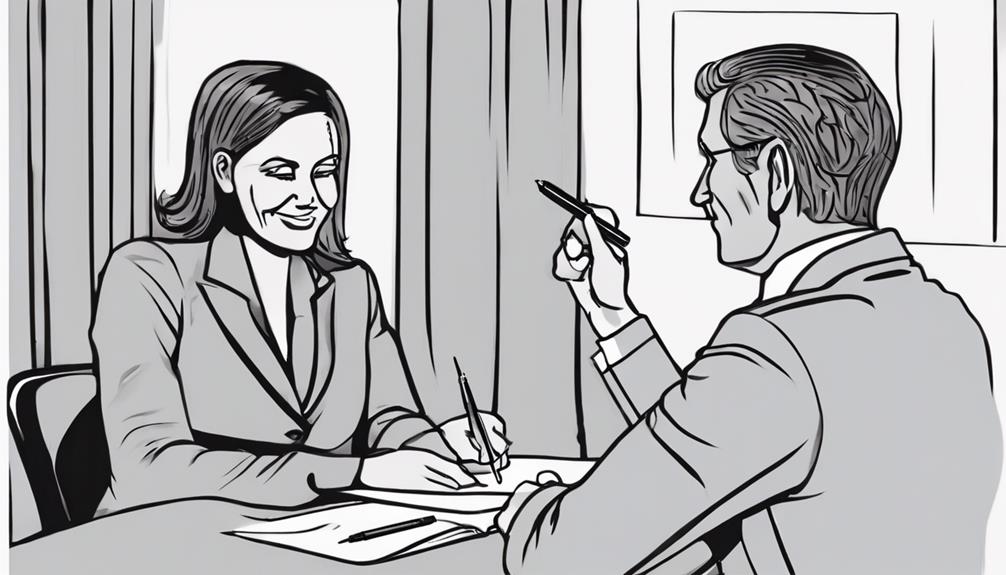Establishing boundaries in subliminal hypnosis sessions is crucial for ethical practice and trust. Clear communication, setting expectations, and respecting client autonomy are key. Maintaining confidentiality and privacy, monitoring nonverbal cues, and addressing boundaries with clients are essential steps. Adhering to physical, emotional, time, professional, and confidentiality boundaries can prevent trust breaches. Strategies such as clear communication and seeking supervision help in maintaining boundaries. Further exploration of how boundaries contribute to a safe environment and positive outcomes awaits.
Importance of Clear Communication

Effective subliminal hypnosis sessions rely heavily on the establishment of clear and unambiguous communication between the hypnotist and the subject. Trust building is a fundamental component of this communication process. The hypnotist must create a safe and secure environment where the subject feels comfortable expressing themselves openly. Trust building involves the hypnotist demonstrating empathy, confidentiality, and respect towards the subject's boundaries and feelings.
Consent checking is another crucial aspect of clear communication in subliminal hypnosis sessions. Before proceeding with any suggestions or techniques, the hypnotist must ensure that the subject has given explicit consent. This not only establishes a foundation of trust but also empowers the subject to take an active role in the hypnosis process.
Research indicates that when clear communication, trust building, and consent checking are prioritized in subliminal hypnosis sessions, the overall effectiveness of the session is enhanced. By fostering a transparent and respectful dialogue between the hypnotist and the subject, the potential for positive outcomes and personal growth is significantly increased.
Setting Session Expectations
Establishing clear session expectations is a critical initial step in ensuring a structured and productive subliminal hypnosis experience. At the onset of the session, it is essential to outline the session structure, including the duration, techniques to be used, and the goals to be achieved. Clearly defining these parameters helps in managing the client's expectations and creating a sense of structure within the session.
Additionally, setting session expectations allows for effective client feedback. By informing the client about what to expect during the session, they are better equipped to provide valuable feedback on their experiences. This feedback is crucial in tailoring the hypnosis techniques to suit the individual client's needs and preferences, ultimately enhancing the effectiveness of the session.
Respecting Client Autonomy

Respecting client autonomy is fundamental in fostering a collaborative and empowering environment during subliminal hypnosis sessions. Client consent plays a crucial role in ensuring that the individual retains control over their participation in the session. Ethical considerations dictate that the hypnotherapist must prioritize the client's right to make informed decisions about their treatment.
Client autonomy involves respecting the client's right to choose whether to engage in hypnosis, the extent of their participation, and the goals they wish to achieve through the process. This autonomy should be upheld throughout the session, with the hypnotherapist continuously checking in with the client to ensure they are comfortable with the process and the direction it is taking.
Furthermore, ethical guidelines emphasize the importance of transparent communication regarding the techniques used, potential risks, and expected outcomes.
Confidentiality and Privacy Measures
Maintaining strict confidentiality and implementing robust privacy measures are paramount considerations in upholding professional standards during subliminal hypnosis sessions. Ethics considerations dictate that hypnotherapists must protect the privacy of their clients and ensure that any information disclosed during sessions remains confidential. This commitment to confidentiality not only respects the client's right to privacy but also fosters trust building and enhances the therapeutic relationship.
Professional standards within the field of subliminal hypnosis emphasize the importance of creating a safe and secure environment where clients feel comfortable sharing sensitive information. By establishing clear boundaries around confidentiality and privacy, hypnotherapists demonstrate their commitment to ethical practices and provide a foundation for effective therapy.
Trust building is a crucial component of the therapeutic process, and maintaining confidentiality plays a significant role in establishing trust between the client and the hypnotherapist. Clients are more likely to open up and engage in the process when they feel confident that their personal information is being safeguarded.
Through conscientious attention to confidentiality and privacy measures, hypnotherapists can create a supportive and trustworthy environment for their clients, ultimately enhancing the effectiveness of subliminal hypnosis sessions.
Monitoring Nonverbal Cues

Effective subliminal hypnosis sessions require astute observation and interpretation of clients' nonverbal cues. Monitoring body language is crucial during these sessions, as it can provide valuable insights into the client's subconscious triggers.
Nonverbal cues such as facial expressions, gestures, posture, and eye movements can offer significant information about the client's emotional state and level of receptiveness to the hypnosis process.
When a client displays closed-off body language, such as crossed arms or avoiding eye contact, it may indicate resistance or discomfort with the session. In contrast, open and relaxed body language suggests a willingness to engage with the hypnotic suggestions.
Additionally, sudden changes in body language during the session can signal emotional responses to the subconscious triggers being addressed.
Addressing Boundaries With Clients
Observing and addressing boundaries with clients is fundamental in ensuring a productive and ethical subliminal hypnosis session. Ethical considerations and professional conduct are paramount when engaging in hypnosis with clients. It is essential to establish clear boundaries and adhere to ethical guidelines to protect the well-being and autonomy of the individual undergoing hypnosis.
Client consent is a critical aspect of maintaining ethical responsibility in hypnotherapy. Before beginning any session, it is imperative to obtain explicit consent from the client, outlining the purpose of the session, the techniques that will be used, and the potential outcomes. This not only ensures that the client is fully informed but also demonstrates respect for their autonomy and decision-making.
Additionally, maintaining professional conduct throughout the session is crucial. This includes respecting the client's confidentiality, avoiding dual relationships, and refraining from exploiting the client in any way.
Handling Unexpected Reactions

Addressing unexpected reactions in subliminal hypnosis sessions requires careful consideration and preparedness on the part of the hypnotherapist. When unexpected reactions occur during a hypnosis session, managing triggers becomes essential. Triggers are stimuli that evoke a strong emotional response from the client, potentially leading to unexpected reactions. To effectively handle unexpected reactions, hypnotherapists must establish clear safety protocols beforehand. Safety protocols should outline steps to take in case of unexpected reactions, ensuring the well-being of the client throughout the session.
In managing triggers, hypnotherapists should be trained to recognize signs of distress or discomfort in clients. By proactively identifying triggers and discussing potential reactions with clients before the session, hypnotherapists can minimize the risk of unexpected responses.
Additionally, having a structured plan in place for addressing unexpected reactions can help maintain a safe and supportive environment during the hypnosis session. Overall, managing triggers and implementing safety protocols are crucial aspects of handling unexpected reactions in subliminal hypnosis sessions.
Frequently Asked Questions
Can Subliminal Hypnosis Be Used for Self-Improvement Outside Therapy?
Subliminal hypnosis can indeed be utilized for self-help applications and personal development benefits outside therapy. Research suggests its potential for enhancing self-improvement by influencing subconscious beliefs and behaviors positively, leading to transformative outcomes.
How Do You Know if a Client Is Ready for Subliminal Hypnosis?
To assess client readiness for subliminal hypnosis, it's vital to conduct a thorough session preparation. This involves evaluating their mental state, expectations, and willingness to engage with subconscious suggestions. Building rapport and discussing goals are key steps.
Is It Possible for Clients to Remember Subliminal Messages After the Session?
Memory retention of subliminal messages post-session can vary based on client readiness and the depth of subconscious influence. Research suggests that while some clients may recall fragments, the majority do not consciously remember, indicating a nuanced process of memory integration.
Are There Any Potential Risks or Side Effects Associated With Subliminal Hypnosis?
Potential dangers associated with subliminal hypnosis include the risk of unintended psychological effects, manipulation, and breaching ethical boundaries. Ethical concerns arise from the potential for subconscious manipulation without explicit consent or awareness.
Can Subliminal Hypnosis Be Combined With Other Therapeutic Techniques?
Combining subliminal hypnosis with complementary therapeutic techniques can enhance personal development. Integrating modalities like cognitive-behavioral therapy or mindfulness practices may offer a comprehensive approach to address diverse aspects of well-being and facilitate holistic growth.
Conclusion
In conclusion, establishing boundaries in subliminal hypnosis sessions is crucial for maintaining a safe and ethical therapeutic environment. Clear communication, setting expectations, respecting client autonomy, ensuring confidentiality, monitoring nonverbal cues, and addressing boundaries with clients are essential components of effective hypnotherapy practice.
By implementing these strategies, practitioners can create a supportive and respectful space for clients to explore their subconscious mind and work towards their therapeutic goals.








































